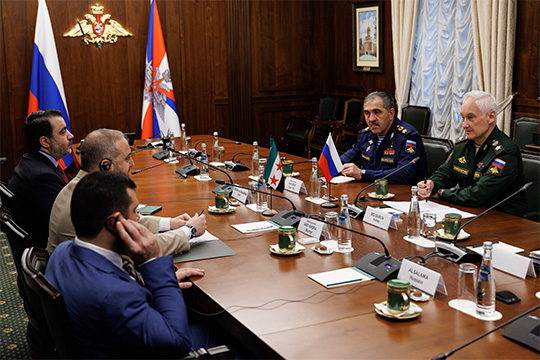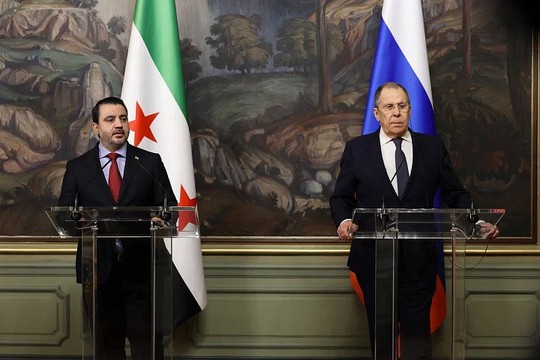Photo: MFA
Foreign Minister Sergey Lavrov’s remarks and answers to media questions during a joint news conference with Syrian Foreign Minister Asaad al-Shibani following talks
Moscow, July 31, 2025
Ladies and gentlemen,
During the talks, Minister of Foreign Affairs and Expatriates of the Syrian Arab Republic Asaad al-Shibani and I noted our mutual interest in maintaining regular dialogue at all levels. Today’s discussions confirmed that we are collaborating constructively, engaging in a frank exchange of views on the state of bilateral relations, prospects for their expansion, and current regional and international issues.
For us, Syria (as we reaffirmed today, and as our partners recognise) remains a good friend in the Arab world and on the global stage. Our position in favour of expanding cooperation is consistent, aimed at strengthening mutually beneficial ties between our nations. It remains unaffected by shifting political dynamics or transitions in government, but is rooted in time-tested traditions of friendship and mutual respect.
These relations have a long history. Today, we revisited the extensive experience of close cooperation in previous decades, including the Soviet Union’s defining role in laying the foundations of Syria’s modern economy, strengthening its defence capabilities, and training national personnel. Tens of thousands of Syrians earned higher education degrees in the Soviet Union and Russia, and today, around 4,000 citizens of the Syrian Arab Republic are studying at our universities.
We support the continued development of our bilateral relations, grounded in the principles of mutual respect and mutual benefit that have been established over the past decades. We are also interested in deepening the dialogue between our respective Foreign Ministries.
In our discussions today, we touched upon the work of our diplomatic missions, our embassy in Damascus and Syria’s embassy in Moscow. In light of the current situation in Syria, we express our sincere appreciation to our Syrian colleagues for the measures they are taking to ensure the safety of Russian citizens and the security of Russian facilities in the Syrian Arab Republic.
Our colleagues shared their assessments of the evolving situation within Syria. We sincerely hope that the challenges arising during this transitional period can be successfully overcome. The recent sharp escalation in the Suwayda province, along with preceding events on the Syrian coast, clearly highlight the ongoing difficulties facing the Syrian leadership and society at this stage.
We support the initiative of the International Committee of the Red Cross to coordinate with the Syrian authorities on establishing a presence in Suwayda province. We believe this step could contribute to stabilising the situation and preventing further deterioration.
We firmly believe that the path to lasting normalisation in Syria lies in inclusive dialogue, the strengthening of national accord, civil peace, and the protection of the rights of all groups within Syria’s multi-confessional society. In this context, we expressed our hope that the measures announced by the government of Transitional President Ahmed al-Sharaa will be aimed precisely at addressing these priorities. We are confident that, as Syria proceeds with its state-building process – according to the announced timeline – these fundamental principles will be fully and appropriately reflected.
We reaffirmed our support for the unity, territorial integrity, and sovereignty of the Syrian Arab Republic. We expressed readiness to provide all possible assistance to the Syrian people in the post-conflict reconstruction process. It was agreed that dialogue on these matters will continue.
We have always opposed the use of Syrian territory as a battleground for geopolitical rivalry among outside powers or as a place to settle scores between states. We consistently call for the consolidation of international efforts in a common direction aimed at stabilising the situation in the Syrian Arab Republic. It is important that all members of the international community refrain from actions that could provoke further escalation of tensions.
We have agreed to continue our contacts. The talks were very useful. The Syrian delegation has several more rounds of meetings scheduled in Moscow across various bodies. I am confident that these will contribute positively to the development of our dialogue.
Question (translated from Arabic): Damascus and Moscow have repeatedly underlined the importance of developing bilateral relations under new conditions. Transitional President of the Syrian Arab Republic Ahmed al-Sharaa has repeatedly stressed that relations with the Russian Federation are longstanding and of great importance. In turn, the Russian leadership has emphasised the need to uphold Syria’s sovereignty, territorial integrity and security. That is from a political standpoint. From an economic point of view, are issues of economic cooperation being addressed in the current context? What is the status of previous agreements, and what are the prospects for Russian companies participating in Syria’s reconstruction?
Sergey Lavrov: Indeed, today we discussed the prospects for advancing our cooperation under the current conditions in all areas: trade and the economy, security (where we also have substantial experience), as well as in the humanitarian sphere, culture and education.
It is clear that over the past years, a number of agreements and contracts were signed under different conditions. We fully understand that the new authorities in Damascus are keen to bring their entire legal framework for engagement with foreign states in line with the interests of the Syrian people, as defined by the country’s current leadership.
We agreed to review all the existing agreements. In fact, this is not the first time we raise this issue. There have already been contacts in this regard, but today we agreed that this must become a permanent process for us. Our Syrian colleagues are interested in exploring cooperation opportunities in security and personnel training, both civilian and military. We will work on this agenda.
As for agreements and contracts in trade and the economy, there are quite a few of them too. We agreed that our Syrian colleagues will fast-track procedures for designating the co-chair of the bilateral Intergovernmental Commission for Trade and Economic Cooperation. Russia has appointed its co-chair. As soon as Syria forms its part of this mechanism, we will task this intergovernmental commission with reviewing all the existing agreements and contracts to find a mutually beneficial and acceptable way for Russia to participate in facilitating Syria’s economic recovery.
Lifting all the sanctions the people of Syria currently face has special importance as far as the international agenda is concerned. Russia has never supported these decisions by the West and prevented the UN Security Council from adopting any sanctions of this kind. Today, our American and European colleagues have started gradually lifting these sanctions while keeping a low profile and moving on a step-by-step basis. This is a step in the right direction. However, we believe that these sanctions must be cancelled once and for all. All they did was harm the people of Syria instead of affecting the political leaders who were targeted by these sanctions, as we were told.
We outlined a work plan and will try to carry out these agreements through our respective ambassadors on a day-to-day basis.
Question: What is your assessment of the current political and humanitarian situation in Syria? What is Russia doing to improve it?
Sergey Lavrov: We discussed this matter during today’s meeting, and our colleagues shared their views. We can see the way that the lingering challenges are reflected in the international media space. Violence breaks out every now and then, as was the case in Suwayda Governorate, or against a Christian church in Damascus.
We supported measures taken by the caretaker government of the Syrian Arab Republic under the leadership of interim President Ahmed al-Sharaa, including his decision to form a new cabinet a couple of months ago and to hold an election in September. Russia wants these elections to be inclusive so that all ethnic and religious groups can contribute to shaping the newly elected legislative bodies.
In this context, we discussed the relations between Damascus and Kurdish forces. Russia is interested in ensuring that the Kurds remain fully integrated within the Syrian society as part of a single state.
What can Russia do to facilitate this process? Not long ago, our country had a chief coordinating role within the UN Security Council. The council adopted a resolution to renew the mandate of the United Nations Disengagement Observer Force (UNDOF) in the Golan Heights until December 31, 2025. My colleague has already mentioned this resolution. Israel has committed serious violations of its terms. Renewing the Security Council’s mandate was instrumental for finding a pathway towards settling this issue within the next six months in keeping with the status of the Golan Heights as set forth in the corresponding UN resolutions.
Russia helps send humanitarian aid to the people of Syria through bilateral channels and through the UN World Food Programme, UNRWA and FAO. We discussed ways to improve our performance, including in terms of coordinating our efforts with other countries which are ready to provide this assistance. We will continue working along these lines.
 Photo: MoD
Photo: MoD
Russian Defence Minister Andrei Belousov held a meeting with Defence Minister of the transitional government of the Syrian Arab Republic Major General Murhaf Abu Qasra in Moscow, Russian MoD informs.
During the talks, the sides discussed prospects of cooperation between the defence departments and the situation in the Middle East.
read more in our Telegram-channel https://t.me/The_International_Affairs

 13:16 01.08.2025 •
13:16 01.08.2025 •























